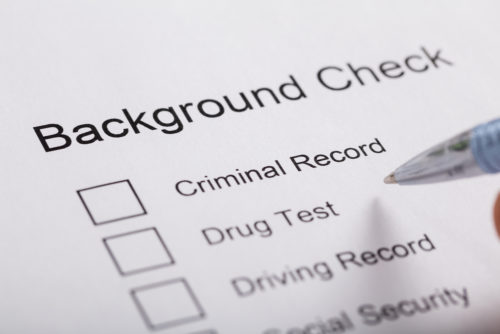Background checks can be utilized for many different reasons: from a criminal background check prior to being offered employment, to a security check when you renew your passport. You can even order background checks from private investigators for a date you met online.
Whether you’re the person seeking out a background check, or you’re the person being checked on, you may be wondering what a full background check contains. The answer, of course, depends on the situation.
Not all background screenings are the same. If you’re applying for a job, the employer may only be interested in investigating any potential criminal history. However, if you’re applying for a government security clearance, your background check will be much more extensive, including past aliases, employers, education, licenses, driving record, and more. Even your landlord may run a background check on you, but it may only contain credit history and criminal history.
Depending on the reason behind the background check it may be subject to the laws and regulations set forth by the Fair Credit Reporting Act (FCRA). Below is information on what may appear on your background check, what it means, and any related laws or regulations.
Table of Contents
Criminal Records
One of the most common subjects to appear on a background check is criminal record history. Traditionally, criminal background checks only contain information on convictions over one’s lifetime and non-convictions (arrests that did not result in a conviction) within the past seven years. However, more extensive criminal background screenings may also contain warrants, incarceration records, and any information that appears on a sex offender registry.
If you are applying for a job, you may be asked to sign a waiver that allows the employer to perform a criminal background check. Most employers utilize a third party agency to investigate criminal backgrounds of applicants, and because of this they are subject to the laws of both the Equal Employment Opportunity Commission (EEOC) and the FCRA, and any laws enacted by the local state government. This means they cannot unfairly discriminate against an applicant if they have a criminal record (as enforced by the EEOC), and they must provide both a reason for why they won’t hire someone due to their criminal record, as well as information on how to dispute any potential incorrect information (as enforced by the FCRA).
As for state laws, they can vary dramatically, and some states may prohibit private employers from performing a criminal background check at all, unless it is essential to the job to have a clean record. To find your individual state’s laws on criminal background check, visit Workplace Fairness.
Arrests
Although not all criminal background checks will show arrests, more extensive searches may list prior arrests, as well as the current status of that arrest. There are three possible designations that may appear in relation to arrests:
- Arrest / Pending Trial: You have been arrested for a crime, but are still awaiting trial and sentencing (whether not-guilty or guilty).
- Arrest / Non-Conviction: You were arrested for a crime, but were found not-guilty by jury or the trial was dismissed by a judge for other reasons (mistrial, lack of evidence, etc).
- Arrest / Conviction: You were arrested for a crime, and were found guilty, either by plea deal or by a jury.
Unfortunately, even innocent individuals can have a criminal record if they’ve been arrested in the past, even though an arrest only means they were suspected of committing a crime at that time. Luckily, due to the FCRA, any arrests that resulted in a non-conviction (not guilty) must be excluded from employment-based criminal background checks after 7 years — unless they later turn into a conviction (such as a parole violation or similar scenario). Sealed or expunged records should not appear on an employment-based criminal background check, but they may appear on a private investigator’s general background check.
Depending on the state you are applying to a job in, arrests may not appear on a background check at all due to local laws.
Misdemeanor and Felony Convictions
What most employers and private investigators are interested in seeing is if you have any prior felony or misdemeanor convictions. These are defined as:
- Misdemeanor: Not as serious as a felony, but more serious than an infraction, misdemeanors are considered crimes of low seriousness. Sometimes repeat misdemeanor offenses can become felony convictions.
- Felony: The most severe classification for a crime is a felony, and these are generally reserved for serious crimes that cause direct harm to another individual or exceed a certain threshold of financial cost for victims.
- Juvenile Convictions (Misdemeanor or Felony): Young offenders of crimes may be tried in juvenile court and receive a juvenile conviction, which traditionally have more lenient sentences than adults. Many juvenile records are “sealed” or hidden by the court system after the defendant has reached adulthood (which varies by state), if that person goes through the process of expungement. If successful in expunging the record, then a juvenile conviction will not show up on a criminal background check, and employers do not have to be notified of the juvenile conviction.
These convictions can range from state, federal, or county convictions. Some past crimes may be expunged if you go through the necessary steps to legally vacate or seal a conviction and those convictions will not appear on an employment background check if the screening occurs after the court documents have been sealed. However, private investigators may still be able to find those convictions, or convictions that happened under a different alias (such as maiden name) based on newspaper articles or by other means.
Generally speaking — unless otherwise prohibited by state law — convictions may stay on your criminal record indefinitely. This can pose problems for those trying to seek employment who have a record, but private businesses are prohibited from discriminating against those with a record by the EEOC. Unless the charges could cause undue hardship to the business (such as requiring more supervision, or increasing the chances of sexual harassment to other workers), the business must consider:
- the amount of time that has passed since the conviction,
- if the conviction would make them liable for negligent hiring practices,
- and if the conviction is particularly heinous in nature.
Also, if the crime is at all related to the line of work, then the business must explain their rejection reasoning to the applicant. For example, a felony burglary charge on an applicant who is applying to a bank teller position: the bank will most likely not be able to hire the applicant due to their previous charges.
Additionally, many states have very particular laws surrounding criminal background checks, such as not showing convictions for those living in the low-income bracket — essentially to offer them a second chance and recognizing the disparate impact a criminal history has on low-income individuals.
Warrants
Depending on how thorough the background check is, and for what purpose, warrants may or may not appear on a criminal background check. Typical pre-employment screenings will only show warrants if the employer has purchased an extensive background check, but private investigators, government officials, and law enforcement may be able to easily find warrants in a background screening.
There are a few types of warrants that may appear on a background check:
- Criminal Warrants: Criminal warrants appear when someone is suspected of committing a crime and law enforcement issues a warrant for that suspect’s arrest. These warrants may or may not appear on a background check, depending on a number of factors, including state laws, being granted access to that information, the date of the warrant, and more. Generally, information on criminal warrants is only accessible to law enforcement, as they are not included in court records.
- Civil Warrants: Civil warrants normally refer to when an individual fails to follow a court order. This can be in cases such as paying child support, withholding property in a bankruptcy suit, and more. Because civil warrants are issued by judges and included in court records, they may show up in a criminal background check, again, according to access and other factors.
- Bench Warrants: Bench warrants are issued when someone does not appear in court for a criminal or civil hearing. A couple examples include when a witness is called to the stand but doesn’t show, or when a defendant missing their hearing. Again, these warrants are issued by judges and included in court records, so they may show up in a background check.
Incarceration Records
Most incarceration records fall under the same rule as convictions, and will only appear next to a conviction that lists your charges. Any expunged convictions or deferred jail time may not appear on a basic criminal record background screening. Additionally, because incarceration and sentencing for a crime is determined by a judge, this information will also be in court records and may be accessible to both private investigators and those performing a pre-employment background check (depending on access). Keep in mind, different states have different laws governing this information.
Sex Offender Registry
The sex offender registry was first created in 1994 due to a federal law commonly known as Megan’s Law, that required law enforcement officials to make certain information available to the public regarding registered sex offenders. Many states adopted a similar law following the creation of the federal law, and each state has their own variations as well as their own sex offender database.
Depending on individual state requirements, employers are not allowed to utilized sex offender registries in hiring decision — most notably in California — and there are other restrictions too, which may prohibit the use of sex offender information for these scenarios:
- Credit check
- Health or other insurances
- Loans
- Education, sponsorship, and fellowships
- Housing decisions
- Benefits, privileges, or other services provided by a business
- Employment
However, employers are allowed to utilize the sex offender registry in hiring decisions if it falls under one of these distinctions:
- The employer is required by law to check the database for hiring decisions (based on local laws and the nature of the business, such as working with children)
- The employer may be held liable for negligent hiring practices after being notified of an employee or applicant on the registry, if they don’t take “appropriate action”
- The employer is using this information to protect a “person at risk”
For non-employment purposes, the use of the sex offender registry varies depending on the intent of the searcher. Luckily, members of the general public are allowed to view their state’s sex offender registry for free on the internet, via each state’s Megan’s Law website. As long as the information isn’t used to make business, insurance, housing, or credit decisions, then any individual may utilize this information for their private use.
Credit Report
Credit reports are typically used exclusively by financial institutions (lenders or banks), but can also be used by landlords, private investigators, and even some employers. By looking through the financial history of individuals, you can get a sense of how they spend their money and the lifestyle choices they typically make. For example, if someone has a lot of credit card debt, but little history of paying it off, then you an make the assumption that the individual in question is not a reliable person to lend to. This is what many banks and lenders consider when applying to credit cards, loans, or mortgages: are you a reliable lender or not?
Credit refers to any account that is essentially “borrowed money.” This can include mortgages, car loans, student loans, credit cards, and more. Your history with credit is what determines your credit score, which will then be a large portion of your credit report. The three major credit reporting companies are Experian, TransUnion, and Equifax, and each have their own methods for determining your score (although they are fairly uniform across the board), and their own methods for disputing inaccurate information, purchasing and accessing your report, and more. There are also alternative credit reporting agencies, although they are less commonly used when it comes to making credit or lending decisions by banking institutions.
Your credit report will typically include the following, no matter what company you contact:
- Identifying Information: this can include your name, your social security number (SSN), any other aliases or SSNs associated with you, and your current address. TransUnion’s version may also include your employment history.
- Account Information: this includes all your loans and various accounts, such as:
- Revolving accounts (lines of credit, credit cards, etc)
- Real Estate accounts (mortgages)
- Installment accounts (student loans, car loans, etc)
- Other accounts not already listed above (delinquent or collection accounts, closed accounts, etc)
- Account Details: this can vary between each credit bureau, but typically your account details will include:
- The creditor’s name
- The account number
- The account type (see above)
- Your recent balance
- The date the account was opened
- The term of the loan, if it is not revolving
- The credit limit or original amount of the loan
- The high balance, or the highest owed on the account during its lifetime
- The current balance and the date it was updated
- The agreed-upon monthly payment
- The amount of your last payment
- The status of the account
- Any past-due amounts
- The payment status
- Comments from the creditor
- Public Records: this information may negatively affect your credit score, and is typically associated with court proceedings such as: bankruptcies, tax liens, and other related court records. Some states also report cases of overdue child support, which may appear in this section.
- Credit Inquiries: this information refers to any previous credit inquiries you may have made within the past two years, such as:
- Hard inquiries, which occur when you apply for a new line of credit, loan, or request a credit report.
- Soft inquiries, which do not affect your credit score and are typically done through online sites that will show you your credit score, or being pre-approved for lines of credit by a banking institution. Keep in mind, the only version of the report that will show soft inquiries is your private version; not banks’, creditors’, or lenders’ versions.
All credit reports are protected by the FCRA and the Federal Trade Commission (FTC), and any private investigators, individuals, or employers that want to perform a credit check or credit score inquiry on anyone else must first get written approval to do so. Employers typically can only see bankruptcies within the past 10 years, collection accounts within the past 7 years, and account information.
Driving Records
Driving records typically are only researched when an individual is entrusted to drive a vehicle. For example, if someone is working for a commercial company and is required to drive a large vehicle, then the employer may perform a driving background check. This is done to ensure that:
- The employee being researched has the proper licenses to drive and operate the vehicle in question
- The employee does not have a prior history of severe driving convictions or license suspensions
Generally, the person being researched must first give consent to the driving records search before it can be performed for employment purposes. States also have unique laws that pertain to driving records, and some states may require employers to only see the past 10 years of driving records, while others only allow 3 years of driving records. Private investigators may also research driving records, and may be able to find previous charges that were expunged, crashes that weren’t reported, car insurance changes, and other incidents that may be important to note for whatever purpose.
Education Records
Typically reserved for college enrollment and private investigation purposes, education records may include a transcript of your grades in school (both K-12 and higher education), confirmation of enrollment in universities or colleges, and any credits accrued in higher education. Written permission is required to be able to investigate education records on any individual.
Employment Records
Employment records are used to verify a person’s employment history, but is often one of the most common areas of falsified information. Applicants can easily fill out their job history over the past 7 years, but can just as easily lie about their dates of employment, reasons for leaving, or if they even worked there in the first place.
There are many parties that may be interested in employment history, including potential future employers, landlords, private investigators, and banking institutions. In general, your employment history can help other people determine how loyal you are to your employer(s), as well as job and income stability. However, due to the chances of falsified information, it is crucial that employers and others perform a thorough employment check on the person of interest; either through a third party agency or a private investigator.
For hiring and employment purposes, employment background checks are protected by the FCRA. The person of interest must first give consent to perform the employment background check. If they refuse, then they may be asked to provide some other form of verification, such as a W2, pay stub, or other tax document.
A traditional employment background check may include the following information:
- Job start and end date
- Job titles held
- Job responsibilities and duties
- Salary
- Reason for termination or departure (dependent on the state and local laws)
- Rehire eligibility
Additionally, with permission, private investigators may be able to find out even more information by interviewing past managers, coworkers, and other professional associates. This can help them get a better idea of the person’s character while on the job.
Again, information acquired for employment background checks can vary from state to state, and some states may only allow access to specific information. Additionally, many businesses may choose to only investigate jobs within the past 3 years, or up to the past 10 years — all depending on the preference of the business and hiring manager.
Identity Validation
In general, identity validation checks are some of the most foundational checks that you can perform on a person. Once identity has been validated, employers and agencies can then move on to other forms of background checks.
Similar to employment history background checks, identity validation can be used to further establish the validity of an applicant for a job position. Additionally, private investigators can research the identity of an individual of interest, for whatever the reason may be.
Identity validations can also help prevent the continued use of stolen identification. As national concern increases about identity theft, more and more employers are becoming aware of the potential for applicants to be using stolen information. Although it’s uncommon, it’s still extremely beneficial to perform an identity validation check on applicants to ensure they aren’t using the information of someone else.
Aliases
Many people may have gone through name changes over the course of their lifetime. The most common reason is marriage, but individuals may change their name for a host of other reasons, and sometimes this can cause information to get lost in the shuffle. Confirming past aliases can help employers or investigators get a complete background of the person in question. Validating someone’s identity will populate any past legal name changes that may have occurred over their lifetime.
Contact Information
Additionally, identity validation will also populate any past contact information associated with the person in question. This can include:
- Landline or cellphone numbers
- Addresses for homes
- Addresses for any owned businesses
Phone numbers in particular might be a subject of interest for private investigators. Although not always an indicator of bad behavior, young individuals with many different phone lines associated with their name may signify unusual activity.
Social Security Number (SSN) Validation
With consent, investigators and background check agencies can also verify the SSN of an individual by validating the information provided. However, most SSN validation checks will only verify that the SSN is a real government-provided number. It is often up to the agency or investigator to check the SSN information against the other information provided (addresses and aliases) to ensure the SSN isn’t a stolen number.
If an SSN is unavailable due to the applicants citizenship status, many third party agencies can also use global passport information or other government-issued identification from non-US countries.
Personal Information
Typically, personal information is not something employers are interested in acquiring. Private investigators, however, may be interested in knowing more about an individual and that individual’s character by learning about their known associates, marriages, and social media.
Family and Known Associates
The best way to learn more about someone’s character is to see who they associate with. Investigators may be able to learn more about someone by finding out who their parents, siblings, larger family, and friends are, and what each individual’s character and relationship is like.
Marriage Records
Marriage records are public information, and private investigators can easily compile information on how many marriages a person has had, as well as who the marriage was with. Often times they can also compile information on:
- Jointly owned property
- Location and date of marriage
- Further personal details on current and previous spouses
Social Media Accounts
In today’s time, social media is its own window into the lives of individuals, and private investigators — as well as employers — can easily perform a social media background check on people of interest. There are no laws, yet, governing the use of social media in hiring decisions, although there have been plenty of articles and scandals on the topic.
With a social media check, agencies and investigators can locate how many social media accounts is associated with a person’s name, as well as any comments or postings that person has made over the years. More extensive checks may reveal posts that were even deleted or hidden. Investigators can then use this information to find out more about the character of the person in question; even whether they’ve talked about performing illegal activities, infidelity, or have talked negatively or prejudicially about groups of people in the past.
Licenses
A license check can be done on individuals to either verify their credentials, discover more about their character, or to determine if they have any restrictions or violations associated with their name on either a state or federal level. Employers, private investigators, and individuals can all research licenses without needing permission, although license checks online may cost money.
Some licenses that individuals may be able to research include:
- Drivers License: As mentioned in driving records, checking the driver’s license of an individual can reveal if they have any restrictions or additional licenses that can help determine their qualifications for a job.
- Gun License: You can find out what guns the individuals owns and what uses the individual has for those guns (hunting, law enforcement, etc).
- Attorney: You can discover when and where an attorney passed the bar to become a licensed professional.
- Private Investigator License: You can find out the status of their license, when it was issued, when it expires, and if they have any prior complaints associated with their practice.
- Medical License: You can check the status of a medical license and what license(s) that healthcare professional holds.
- Pilot License: You can check what license they have, where they received it, and any additional certifications that pilot has earned.
Military Records
Acquiring military records often requires the permission of the person in question, but doing a military records check can help you verify the information of that individual for employment or personal purposes. A military records check can show you:
- Date of service
- Location of active duty (as long as it’s declassified)
- Discharge status, and why they were discharged (if applicable)
- Home address at time of entry and discharge
- Final duty assignments
- Final rank
- Military education and job specialty
- Medals, accolades, certificates, campaign awards, or citations
- Total creditable service (including foreign service)
- Reasons for leaving
- Reenlistment eligibility
The Seven Year Rule and Background Checks
One of the most important laws for employers and agencies to keep in mind is the 7 year rule set forth by the FCRA. This rule is intended to prevent the display of adverse information in a background check after 7 years, such as civil suits, civil judgments, dismissed convictions, or arrests that didn’t result in a conviction.
It’s important to keep in mind that the 7 year countdown doesn’t start until the adverse information is first filed or entered into the record. This includes charges that are later dismissed by a judge: the countdown starts when that charge is first filed, not when it is dismissed.
However, criminal convictions have no time limit on background checks, and can remain on your record indefinitely unless you go through the process of expungement or sealing juvenile records. Luckily, the EEOC instructs private employers to consider the amount of time that has passed since those convictions have occurred. Even if they remain on your record, employers are prohibited by law from discriminating against you — especially if you have a drug offense from the 80’s that isn’t relevant to the position, or some similar, non-violent offense from years past.
And, as with many other FCRA rules and regulations, each state has their own laws regarding the use of adverse information on background checks. Be sure to check the local laws in your area to ensure your employer is following them, and that you yourself are not violating local laws in a background screening.
Image Source: https://depositphotos.com/





